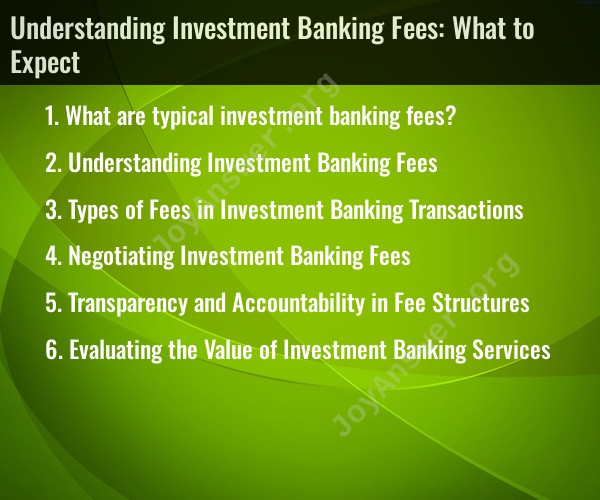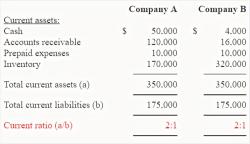What are typical investment banking fees?
Investment banking fees can vary significantly based on the services provided, the complexity of the transaction, the size of the deal, and the specific terms negotiated between the investment bank and the client. However, there are several typical types of fees associated with investment banking services:
Mergers and Acquisitions (M&A) Advisory Fees:
- M&A advisory fees are charged for services related to mergers, acquisitions, divestitures, and other corporate transactions. These fees are often calculated as a percentage of the transaction's total deal value. The typical range is 1% to 5% of the transaction value, but it can vary widely based on the deal's size and complexity.
Underwriting Fees:
- Underwriting fees are associated with the issuance of securities in the capital markets. For initial public offerings (IPOs) and secondary offerings, investment banks charge underwriting fees. These fees are calculated as a percentage of the total funds raised. The percentage can vary but is often around 2% to 7% for IPOs.
Placement and Agency Fees:
- These fees are related to private placements and debt issuances. Investment banks may charge placement fees for facilitating private equity placements, and they may charge agency fees for acting as agents to distribute debt securities. The fees can vary but are typically based on a percentage of the funds raised.
Advisory Fees:
- Advisory fees are charged for providing financial and strategic advice. These fees are typically negotiated based on the complexity and scope of the advisory work and may be structured as hourly fees, monthly retainers, or success-based fees.
Transaction Incentive Fees:
- In some cases, investment banks may negotiate incentive fees based on the successful completion of a transaction or the achievement of specific financial targets. These fees are contingent upon the transaction's outcome.
Commitment Fees:
- Commitment fees are charged in the context of revolving credit facilities or standby letters of credit. These fees are typically an annual percentage of the unutilized portion of the credit facility.
Monitoring Fees:
- In certain situations, investment banks may charge monitoring fees to continue providing advisory or support services to the client after the completion of a transaction. These fees are typically structured as monthly or annual payments.
Management Fees (Private Equity and Venture Capital):
- In the context of private equity and venture capital, management fees are charged to cover the ongoing operational expenses of managing a fund. These fees are typically calculated as a percentage of the fund's total assets under management (AUM) and are usually annual fees.
Success Fees (Private Equity and Venture Capital):
- Private equity and venture capital firms may charge success fees, also known as carried interest, based on the profits generated from investments. This fee is typically calculated as a percentage of the investment gains, often after a preferred return threshold is met.
Custody and Administration Fees:
- Investment banks that provide custody and administration services charge fees for safekeeping and managing financial assets on behalf of clients. These fees can be structured as a percentage of AUM or as fixed fees.
It's essential to note that these fees can be subject to negotiation, and the specific terms of the agreement between the investment bank and the client can vary widely. Additionally, the regulatory environment and industry standards can influence the fee structure. Clients engaging in investment banking services should carefully review fee agreements and consider how the fees align with the expected value and quality of services provided.
Understanding Investment Banking Fees
Investment banking fees are the compensation that investment banks receive for their services. These services can include mergers and acquisitions (M&A), capital markets advisory, and restructuring. Investment banking fees are typically a percentage of the deal value or a fixed fee.
Types of Fees in Investment Banking Transactions
The following are some of the most common types of fees in investment banking transactions:
- Advisory fees: These fees are paid for the investment bank's advice and expertise on a transaction. Advisory fees are typically a percentage of the deal value.
- Success fees: These fees are paid only if the investment bank is successful in completing a transaction. Success fees are typically a percentage of the deal value.
- Placement fees: These fees are paid for the investment bank's services in placing securities with investors. Placement fees are typically a percentage of the amount of securities placed.
- Underwriting fees: These fees are paid for the investment bank's services in underwriting a securities offering. Underwriting fees are typically a percentage of the amount of securities offered.
- Retainer fees: These fees are paid on a monthly or quarterly basis to secure the investment bank's services. Retainer fees are typically refunded if the investment bank is not successful in completing a transaction.
Negotiating Investment Banking Fees
Investment banking fees are negotiable. When negotiating fees, it is important to consider the following factors:
- The size and complexity of the transaction
- The investment bank's experience and expertise
- The investment bank's track record of success
- The market conditions
Transparency and Accountability in Fee Structures
Investment banking fee structures are often complex and opaque. This can make it difficult for clients to understand and negotiate fees. In recent years, there has been a growing movement towards greater transparency and accountability in investment banking fee structures.
Some of the initiatives that have been taken to improve transparency and accountability in investment banking fee structures include:
- The Investment Banking Committee of the Securities Industry and Financial Markets Association (SIFMA) has developed a set of best practices for investment banking fee disclosure.
- The Financial Industry Regulatory Authority (FINRA) has proposed new rules that would require investment banks to disclose more information about their fees.
- The Securities and Exchange Commission (SEC) has also proposed new rules that would require investment banks to disclose more information about their fees.
Evaluating the Value of Investment Banking Services
When evaluating the value of investment banking services, it is important to consider the following factors:
- The quality of the investment bank's advice
- The investment bank's expertise in the relevant industry
- The investment bank's track record of success
- The investment bank's fees
It is also important to make sure that the investment bank's interests are aligned with the client's interests. For example, if the investment bank is being paid a success fee, it is important to make sure that the fee is structured in a way that incentivizes the investment bank to complete the transaction on terms that are favorable to the client.
By understanding investment banking fees and how to negotiate them, clients can ensure that they are getting the best possible value for their money.













